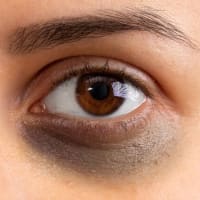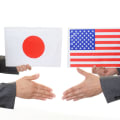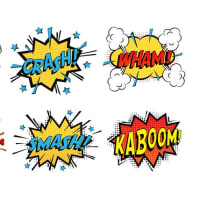Dali is writing the word “oof” on a chopstick wrapper and shows it to me…
(ダリちゃんは箸袋にoofという文字を書いて僕に見せながら……)
Dali Look! Do you know “oof”?
ダリちゃん ねえ! oofって知ってる?
Me No. What’s that? Is it English?
私 知らない。何それ? 英語?
Dali Yes, of course. It’s pronounced ‘u: f.’
ダリちゃん もちろん。「ウーフ」って発音するんだ。
Me Oh, what does it mean?
私 ふ~ん。何ていう意味?
Dali It has no meaning. It’s just sound. One may utter the sound when getting punched in the stomach. Let’s try!
ダリちゃん 意味はないよ。ただの音。おなかにパンチを食らった時に発する音。やってみようか。
Me No, thank you! Let’s get back on track. Is it like a dog barks wan-wan or a cat sings nya-nya?
私 いや結構。本題に戻ろうよ。それって犬が「ワンワン」って吠えて、猫が「ニャーニャー」って鳴くのと同じ?
Dali Yes, you are right. We have a number of such sound words in English. For example, the dog barks woof-woof, and the cat sings meow-meow. Such sound words are also commonly seen in American comics like Superman, Captain America, Batman, and Spider-Man. These include Bang, Splat, Boom, Chirp, Beep, Clink and so on.
ダリちゃん そう。その通り。英語ではそんな音を表す単語がいくつかあるよ。たとえば、犬はwoof-woofと吠えるし、猫はmeow-meowと鳴く。そんな音を表す単語は、スーパーマンやキャプテンアメリカやバットマンやスパイダーマンなどアメリカのコミックでもよく見かける。BangやSplat、Boom, Chirp、Beep、Clinkなど。
Me Yes, yes, yes. I know some, such as cuckoo, pitter-patter, and ding-dong… Anyway, what do you call such words in English?
私 そうそうそう。僕も知ってるよ。cuckoo、pitter-patterやding-dongなど。で、そんな単語、英語でなんて言うの?
Dali Well, I will tell you…It’s otonabe…??? Oh, it just slipped my mind! (Dali is quickly browsing on the Internet…) Oh, it’s called onomatopoeia.
ダリちゃん えへん。教えてあげよう。それはねotonabe??? えーと、何だったかな? 度忘れしちゃった(ダリちゃん、すかさずネットで調べる)。そう、onomatopoeia(オノマトペ)っていうんだ。
Me Wow, it sounds Greek!
私 ワ―、ギリシャ語みたい!
Dali It says here that onomatopoeias are words that are used to express sounds. But I think that the number of Japanese onomatopoeias far exceeds that of English.
ダリちゃん オノマトペとは「音」を表現するのに使われる言葉とここには書かれている。でもね、わしは日本語のオノマトペの方が英語のよりずっと多いと思うんだけど。
Me Yes, there are many, like meh-meh (baa baa), chu-chu (squeak squeak), bu-bu (oink oink), doki-doki (excited), goro-goro (thunder rumbling) and so on.
私 そう、たくさんあるね。たとえば「メ―メ―」「チューチュー」「ブーブー」「ドキドキ」「ゴロゴロ」なんか。
Dali Furthermore, Japanese onomatopoeias seem not to be restricted to sound words but also include those that depict states, feelings, and movements, which make no sounds. Examples are waku-waku (excited), kira-kira (sparkling), ira-ira (irritated), and bik-kuri (shocked).
ダリちゃん それにね、日本語のオノマトペは音を表す単語に限らず、状態、感情、動作など音を出さない単語も含まれるんだ。たとえばね、「ワクワク」「キラキラ」「イライラ」や「びっくり」など。

Me I see. By the way, what made you bring up “oof,” anyways?
私 そうなんだ。で、なぜそもそもoofって話になったの?
Dali Actually, on my way here today, I went past a very old stationary store with an old wooden sign, which says Matsuura Bunguten (Stationary). Matsuura is of course the store name, and was written in katakana. As the signboard became very old, the upper horizontal bar of the last katakana character ‘ra’ had fallen off, converting ‘ra’ to ‘fu.’ So, instead of the correct name of ‘Matsuura,’ it was read as ‘Matsu-oof.’ That made me think of the ridiculous idea of ‘oof.’
ダリちゃん じつはね、今日ここに来る途中、とても古い文房具屋さんの前を通ったんだけど、古い木製の看板が掛かってあってね「マツウラ文具店」と書かれてたんだ。「マツウラ」はもちろん店名。で、カタカナで書かれてあった。その看板はとても古くなっていたので、最後のカタカナの文字「ラ」の上の横線が落ちてしまっていて、「ラ」が「フ」になっていたんだ。で、正しい名前の「マツウラ」じゃなく「マツウフ」って読めたんだ。「ウーフ」なんて笑っちゃうじゃない?
Key words(キーワード)
onomatopoeia: 擬音(擬声)語
chopstick wrapper: 箸袋
utter: (声・言葉・うなり声・ため息などを)口から出す、発する
stomach: 胃、腹部、腹
woof-woof: ワンワン(犬が吠える声)
meow-meow: ニャーニャー(猫の鳴き声)
bang: ドン(バタン)という音
splat: ピシャっという音
boom: ブーンと鳴る音
chirp: チューチュー、チーチー(小鳥や昆虫の鳴き声)
beep: (警笛などの)ビーッという音
clink: (薄い金属片・ガラスなどの触れ合う、鋭い)チリンと鳴る音
cuckoo: カッコウの鳴き声
pitter-patter: (雨の)パラパラいう音
ding-dong: キンコン、ゴーンゴーン
baa baa: メ―メ―(羊、子羊の鳴き声)
squeak squeak: (ネズミなどの)チューチュー鳴く声
oink oink: ブーブー(豚の鳴き声)
rumbling: ゴロゴロいう音
be restricted to: ~に限られる
depict: (を)描く、描写する、叙述する
signboard: 看板
convert: (~を)(~に)変える、転換する
encounter: (偶然)出会う、出くわす、遭遇する
Comments(コメント)
I was surprised that there are thousands of onomatopoeias in Japanese language, the number of which far exceeds that of English. From our conversation, I rediscovered this unique aspect of Japanese language. Great difficulties may be encountered when translating Japanese onomatopoeias into English.
日本語には何千と言うオノマトペがあるって僕は驚いたね。英語よりずっと多いんだから。会話で日本語のユニークな一面を再発見したように思う。日本語のオノマトペを英語に訳するのにはとても苦労するかもね。























